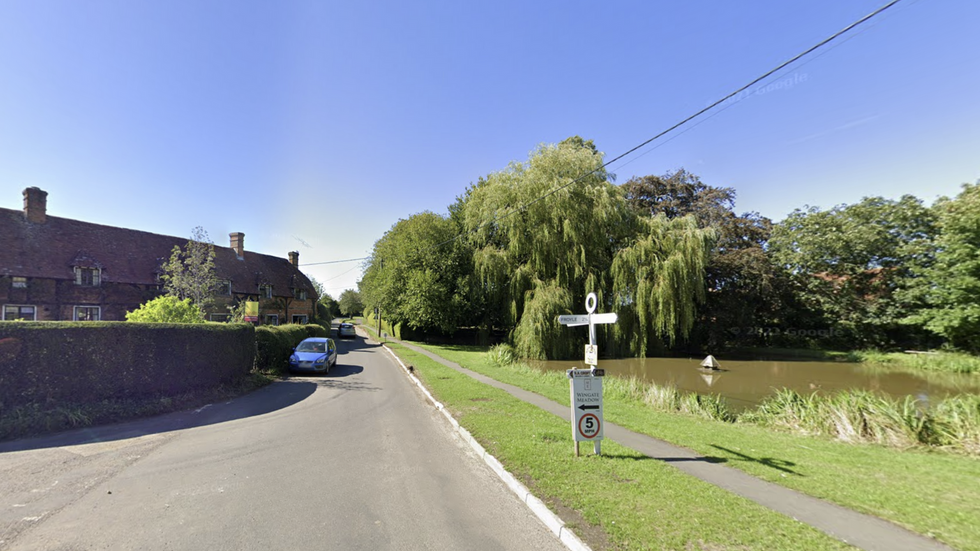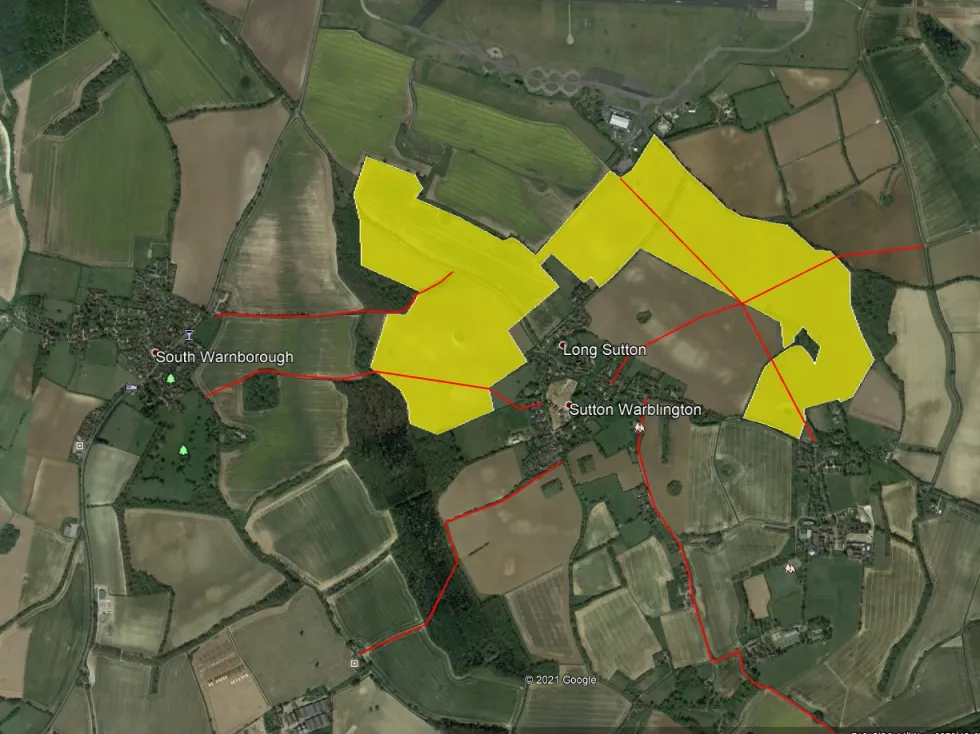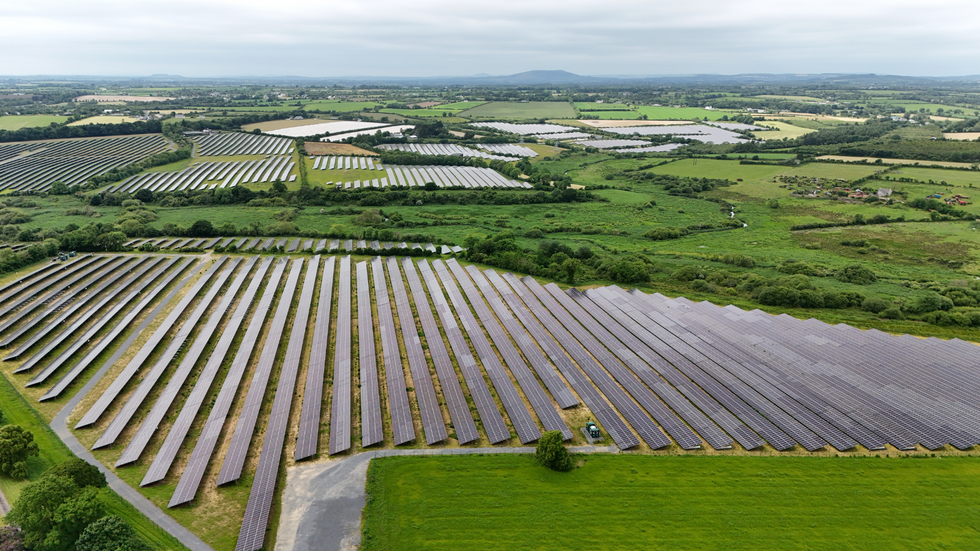James Saunders
Guest Reporter
A controversial solar farm development has been approved in rural Hampshire, despite fears it threatens one of Britain's oldest roads.
The 2,500-year-old Harrow Way, an ancient trackway dating back to Neolithic times, runs through the village of Long Sutton - where the massive green energy project is set to be built.
Hart District Council has given the go-ahead for the development, despite fielding nearly 200 objections from locals concerned about its impact on the historic route.
The ancient road connects more than 200 miles of countryside between Dover in Kent and Seaton in Devon via Stonehenge.

While the nhe development will cover 259 acres - equivalent to 150 football pitches - in a village of fewer than 700 inhabitants which boasts more than 30 listed buildings.
Seven-foot-high solar panels are also due to dominate the landscape for the next 40 years under the plans.
And residents have also voiced their fury after it emerged the installation will be surrounded by high fencing, barbed wire and CCTV cameras.
But despite scores of locals protesting at the council's planning committee meeting, members narrowly voted to approve the plans from energy firm Fleet Solar.
The farm is expected to power up to 30,000 homes.
Pamela van Moppes, 82, who has lived in the parish for 55 years, criticised planning committee members for not visiting the site.
MORE SOLAR FARM OUTRAGE:

"I think that's wicked. I think that's the worst sin ever," she said.
While Ian Howard, 69, who built his house "for the view" 40 years ago, blasted: "The Harrow Way runs right through all of the village. We would have solar development on the right and solar development on the left, so the view from this ancient road is definitely impaired."
Vicar Gillian Wilton, who presides over the 13th century All Saints church, said she was "distraught".
"I think everyone's very much in favour of solar panels and of doing things to protect the environment – it's not that. It's about whether this site is appropriate, and it's about the sheer size of it," she added.
Dr Lars Mosesson, 78, a long-standing Green Party member who has stood as a candidate at elections, opposes the development.
"We will see how completely changed the character will be, it won't be a rural village any more," he said.
NEIGHBOURS TAKE ON COUNCILS - READ MORE:

He added that the character of the village would be "completely changed".
"It won't be a rural village any more, it will be a concentration camp," Dr Mosesson fumed.
He warned the project represents an "abuse of the climate emergency" and has urged other communities to be vigilant.
"One of the things would be the abuse of the climate emergency. It's a vital policy, but it was the failure to consider the issues relating to the site, the appropriateness of that. I would like to warn other people that this may been used by developers," he added.
Residents have also voiced concerns about more than 100 acres of farmland being taken out of production.
A council planning report defended the approval, stating: "The provision of renewable energy is a key objective of the government's net zero objectives for 2050. The plan in balance is in full accordance with the Government's overarching objectives."
Find Out More...
The 2,500-year-old Harrow Way, an ancient trackway dating back to Neolithic times, runs through the village of Long Sutton - where the massive green energy project is set to be built.
Hart District Council has given the go-ahead for the development, despite fielding nearly 200 objections from locals concerned about its impact on the historic route.
The ancient road connects more than 200 miles of countryside between Dover in Kent and Seaton in Devon via Stonehenge.

While the nhe development will cover 259 acres - equivalent to 150 football pitches - in a village of fewer than 700 inhabitants which boasts more than 30 listed buildings.
Seven-foot-high solar panels are also due to dominate the landscape for the next 40 years under the plans.
And residents have also voiced their fury after it emerged the installation will be surrounded by high fencing, barbed wire and CCTV cameras.
But despite scores of locals protesting at the council's planning committee meeting, members narrowly voted to approve the plans from energy firm Fleet Solar.
The farm is expected to power up to 30,000 homes.
Pamela van Moppes, 82, who has lived in the parish for 55 years, criticised planning committee members for not visiting the site.
MORE SOLAR FARM OUTRAGE:
- More than a tenth of farmland to become solar farms or eco habitats in net zero drive
- ‘There’s not enough money!’ Fears desperate farmers could ABANDON food-production and turn land into mass solar farms
- Locals launch last-ditch effort to stop 3,000 acre solar farm they claim will 'destroy our way of life'

"I think that's wicked. I think that's the worst sin ever," she said.
While Ian Howard, 69, who built his house "for the view" 40 years ago, blasted: "The Harrow Way runs right through all of the village. We would have solar development on the right and solar development on the left, so the view from this ancient road is definitely impaired."
Vicar Gillian Wilton, who presides over the 13th century All Saints church, said she was "distraught".
"I think everyone's very much in favour of solar panels and of doing things to protect the environment – it's not that. It's about whether this site is appropriate, and it's about the sheer size of it," she added.
Dr Lars Mosesson, 78, a long-standing Green Party member who has stood as a candidate at elections, opposes the development.
"We will see how completely changed the character will be, it won't be a rural village any more," he said.
NEIGHBOURS TAKE ON COUNCILS - READ MORE:
- Council row leaves village divided as fishermen battle second homeowners over 'noisy' boatyard
- Council row erupts after huge pirate ship erected in garden as supporters vow to 'tie themselves' to enormous vessel
- Lib Dem-led council lambasted over plans to splash £10k on chopping down ‘important’ palm trees

He added that the character of the village would be "completely changed".
"It won't be a rural village any more, it will be a concentration camp," Dr Mosesson fumed.
He warned the project represents an "abuse of the climate emergency" and has urged other communities to be vigilant.
"One of the things would be the abuse of the climate emergency. It's a vital policy, but it was the failure to consider the issues relating to the site, the appropriateness of that. I would like to warn other people that this may been used by developers," he added.
Residents have also voiced concerns about more than 100 acres of farmland being taken out of production.
A council planning report defended the approval, stating: "The provision of renewable energy is a key objective of the government's net zero objectives for 2050. The plan in balance is in full accordance with the Government's overarching objectives."
Find Out More...
